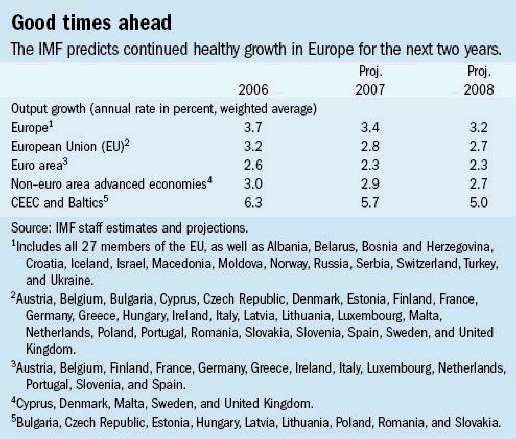
Typical street scene in Santa Ana, El Salvador. (Photo: iStock)
IMF Survey: Europe Set for Sustained Expansion, Says IMF
April 23, 2007
- Growth has benefited from synergies between east and west
- Labor and product market reforms have helped reduce structural unemployment
- New member states need to enact policies that will allow them to adopt the euro
Europe's upswing is showing momentum, creating bright prospects for 2007 and 2008, according to Michael Deppler, head of the IMF's European Department.

Cell phone store in Bucharest, Romania: EU growth has benefited from enlargement, says IMF (photo: Stevens Frederic/SIPA)
EUROPEAN OUTLOOK
"The situation in Europe, which improved markedly last year, is set for a sustained expansion," he told journalists at an April 14 press briefing during the IMF-World Bank Spring Meetings. Europe as a whole is expected to see growth of 3.4 percent in 2007, against 3.7 percent last year (see table). The euro area is set to expand by at least 2.3 percent this year.
Deppler noted that "part of this strong outlook is due to good policies. Monetary policy has been appropriately conducted, fiscal policies have gotten back on track and countries have undertaken significant structural reforms." In Europe's advanced economies, continuing job creation, falling unemployment, and low inflation are providing the basis for stronger private consumption.
In emerging—or perhaps more aptly named converging—Europe, business investment has been boosting production and export capacity, leading to strong growth. More broadly, growth has also benefited from the synergies between east and west, rooted in the general cyclical upswing as well as more structural developments, such as enlargement.
Europe may well surprise on the upside
While external risks to Europe's economic outlook are tilted to the downside, mainly because of the uncertainty surrounding the U.S. economy, Deppler thought that "it would take a very large negative external shock to significantly derail recovery in Europe." In fact, short-term indicators inspire confidence that the cyclical upswing may exceed expectations.
But there are still risks. A stronger-than-expected slowdown in the United States or a disorderly unwinding of global imbalances are possible, but the impact on Europe would likely be muted relative to the experience in 2001-02, when the bursting of the dotcom bubble dealt a common shock both inside and outside Europe. Most importantly, the very large cross-border financial flows into central and eastern Europe could push convergence past its speed limits. While these flows have been used productively in most of converging Europe, financial convergence may be running ahead of fundamentals in some countries. Rapid credit growth could sow the seeds for trouble in the event of a generalized retrenchment from risky assets or a domestic policy slippage.
Productivity remains key
According to Deppler, "performance is improving, but we don't know how much is cyclical and how much is structural." Europe's advanced economies are still failing to make notable inroads in closing the transatlantic divide in per capita GDP. Encouragingly, recent labor and product market reforms have helped reduce structural unemployment. But labor utilization remains low and signs of a much needed revival in productivity growth are tentative.

The best way to achieve higher productivity and improve Europe's potential growth rate is through strengthened competition. To that end, policymakers should seek to further deregulate product markets, complete the EU single market, especially through a swift implementation of the EU Services Directive, and foster financial integration.
For their part, Europe's converging economies need to deliver the higher growth potential that investors are anticipating. They have made great strides compared to old EU member states, Deppler noted, but viewed over a decade, they are not doing as well as better performing peers, notably in Asia. For these economies, sustaining the pace of structural reforms is essential. This will make labor and product market more flexible and facilitate the reallocation of resources that convergence entails. More generally, new member states need to put in place the policies that will allow them to successfully adopt the euro.
Making good times last
These are well-deserved good times for Europe, Deppler said. However, good times have in the past led to shortsightedness and policy mistakes. To keep up the positive momentum, it will be essential for countries to maintain a medium-term focus in their policies and not let today's positive economic news sidetrack them from addressing tomorrow's challenges —aging, rigidities, and inefficiencies. For both western and eastern Europe, it is very important to take advantage of the current favorable conditions to continue fiscal adjustment and complement continued labor market reforms with a much greater push to improve productivity.


